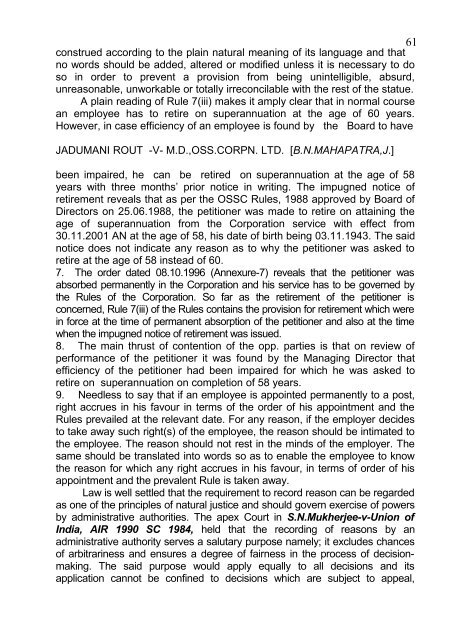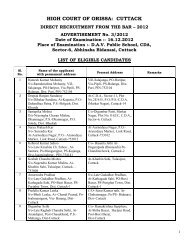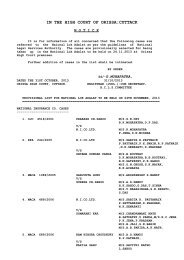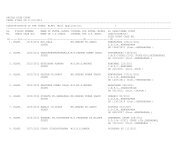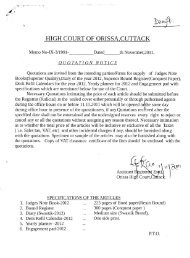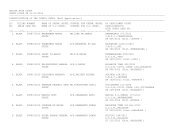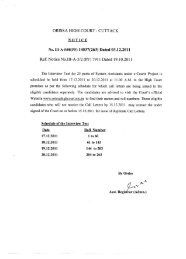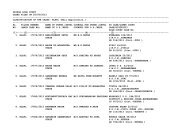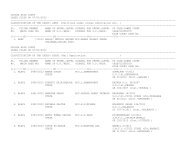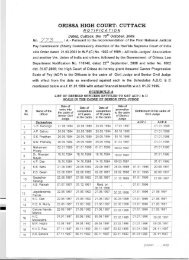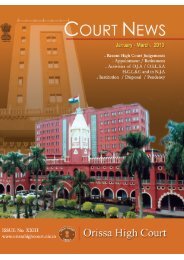ORIGINAL JURISDICTION - Orissa High Court
ORIGINAL JURISDICTION - Orissa High Court
ORIGINAL JURISDICTION - Orissa High Court
You also want an ePaper? Increase the reach of your titles
YUMPU automatically turns print PDFs into web optimized ePapers that Google loves.
61<br />
construed according to the plain natural meaning of its language and that<br />
no words should be added, altered or modified unless it is necessary to do<br />
so in order to prevent a provision from being unintelligible, absurd,<br />
unreasonable, unworkable or totally irreconcilable with the rest of the statue.<br />
A plain reading of Rule 7(iii) makes it amply clear that in normal course<br />
an employee has to retire on superannuation at the age of 60 years.<br />
However, in case efficiency of an employee is found by the Board to have<br />
JADUMANI ROUT -V- M.D.,OSS.CORPN. LTD. [B.N.MAHAPATRA,J.]<br />
been impaired, he can be retired on superannuation at the age of 58<br />
years with three months’ prior notice in writing. The impugned notice of<br />
retirement reveals that as per the OSSC Rules, 1988 approved by Board of<br />
Directors on 25.06.1988, the petitioner was made to retire on attaining the<br />
age of superannuation from the Corporation service with effect from<br />
30.11.2001 AN at the age of 58, his date of birth being 03.11.1943. The said<br />
notice does not indicate any reason as to why the petitioner was asked to<br />
retire at the age of 58 instead of 60.<br />
7. The order dated 08.10.1996 (Annexure-7) reveals that the petitioner was<br />
absorbed permanently in the Corporation and his service has to be governed by<br />
the Rules of the Corporation. So far as the retirement of the petitioner is<br />
concerned, Rule 7(iii) of the Rules contains the provision for retirement which were<br />
in force at the time of permanent absorption of the petitioner and also at the time<br />
when the impugned notice of retirement was issued.<br />
8. The main thrust of contention of the opp. parties is that on review of<br />
performance of the petitioner it was found by the Managing Director that<br />
efficiency of the petitioner had been impaired for which he was asked to<br />
retire on superannuation on completion of 58 years.<br />
9. Needless to say that if an employee is appointed permanently to a post,<br />
right accrues in his favour in terms of the order of his appointment and the<br />
Rules prevailed at the relevant date. For any reason, if the employer decides<br />
to take away such right(s) of the employee, the reason should be intimated to<br />
the employee. The reason should not rest in the minds of the employer. The<br />
same should be translated into words so as to enable the employee to know<br />
the reason for which any right accrues in his favour, in terms of order of his<br />
appointment and the prevalent Rule is taken away.<br />
Law is well settled that the requirement to record reason can be regarded<br />
as one of the principles of natural justice and should govern exercise of powers<br />
by administrative authorities. The apex <strong>Court</strong> in S.N.Mukherjee-v-Union of<br />
India, AIR 1990 SC 1984, held that the recording of reasons by an<br />
administrative authority serves a salutary purpose namely; it excludes chances<br />
of arbitrariness and ensures a degree of fairness in the process of decisionmaking.<br />
The said purpose would apply equally to all decisions and its<br />
application cannot be confined to decisions which are subject to appeal,


